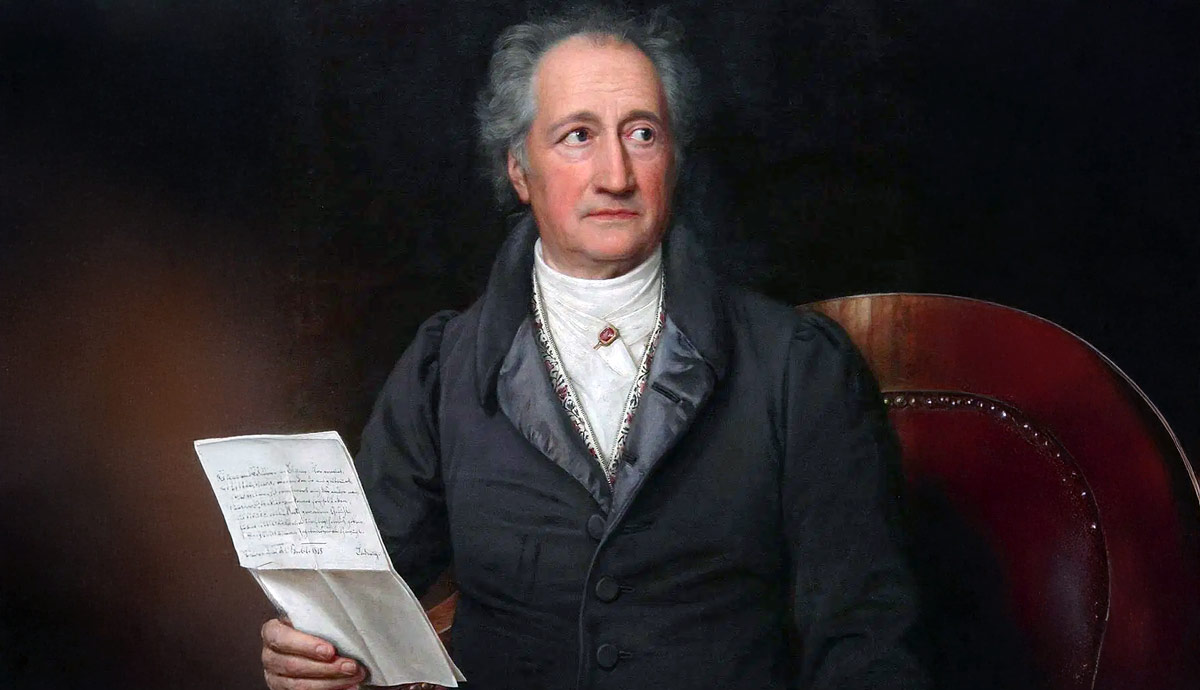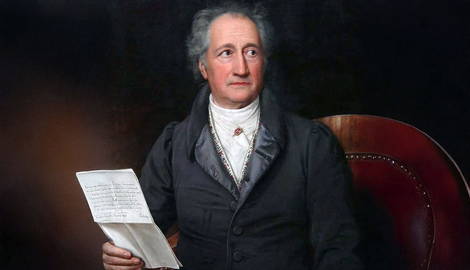
Johann Wolfgang von Goethe was a German polymath whose interdisciplinary contributions were indispensable to our collective intellectual evolution. A poet, novelist, playwright, philosopher, scientist, art critic, and statesman, Goethe cannot be confined to one title. He was a figure of many faces and extraordinary versatility. Let’s journey through Goethe’s life and explore his major contributions along the way.
How Did Goethe’s Social Background Influence His Life?

Goethe’s social background influenced his life in fundamental ways. Born in 1749 in Frankfurt, Goethe was the son of a wealthy bourgeois family. After studying law and traveling around Europe, his father, Johann Caspar Goethe, married the daughter of one of the wealthiest families in Frankfurt and lived on his inheritance, dedicating his time to collecting books and art. Johann had eight children of whom only Goethe and his sister, Cornelia, survived. The two received the finest education through private tutoring until the age of 16, after which the young Goethe was expected to walk in his father’s footsteps – pursue a law degree, travel to Italy and other countries, then return to make a family.

Unlike his contemporaries, Goethe didn’t have to worry about supporting himself financially, which liberated much of his time for literary pursuits. In 1765, Goethe enrolled at the University of Leipzig, but his studies were interrupted a few years later due to a tuberculosis attack. During that time, Goethe started studying alchemy and developed the ideas that would later underpin his most celebrated literary masterpiece, Faust. In 1770, Goethe pursued a doctorate at Strasbourg, where he met his mentor, Johann Gottfried von Herder.
Herder transformed Goethe’s literary and philosophical outlook, allowing him to see language, literature, and art as the cultural expressions of a nation. Enchanted by Herder’s ideals and free from financial burdens, Goethe embarked on a horseback journey through the countryside to uncover national German culture by collecting oral folk songs. His experience on this trip marked the beginning of a chain of romantic misadventures that would significantly influence his literary oeuvres.
Did Goethe Have Commitment Issues?

Goethe had severe commitment issues that repeatedly obstructed his love life yet greatly inspired his literary compositions. In a village called Sessenheim, Goethe fell in love with Friederike Brion, the pastor’s daughter. Despite the intensity of their relationship, Goethe was terrified of commitment and soon left her to return to Frankfurt. The deep suffering Friederike experienced after their separation haunted his writings for over a decade. In 1771, he wrote his first major work, Götz von Berlichingen, which featured a substory whose female lead, Maria, was unjustly betrayed by her lover. Götz was greatly influenced by Herder’s philosophy and turned Goethe into a leading figure in a literary movement known as “Storm and Stress” (‘Sturm und Drang’).

In 1772, Goethe began his second romantic misadventure during his stay in Wetzlar, where he was practicing law at the Supreme Court of the Holy Roman Empire. He fell in love with Charlotte Buff, who was at that time already engaged to someone else. Most likely, his fear of commitment led him to pursue an unavailable woman. After exhausting his patience with this tormenting love, Goethe returned to Frankfurt and wrote The Sorrows of Young Werther – an epistolary semi-autobiographical novel depicting his tragic love for Charlotte.
The novel elevated Goethe to international fame. It was immediately translated into French and later into English. For many years, Goethe was primarily known as the author of Werther. His success led the prince of Weimer, Charles Augustus, to offer him a statesman position. After yet another unsuccessful relationship, this time an engagement with a woman named Lili, Goethe left to settle in Weimer.
How Did Moving to Weimer Influence Goethe?

Moving to Weimer influenced Goethe’s literary productivity. As his responsibilities in Weimer grew, he was no longer able to produce the same quantity and quality of literary works. During that period, however, his interest started shifting from literature to science and philosophy. Goethe approached science from a holistic perspective, integrating phenomenological, aesthetical, and philosophical observations into his empirical studies.
His scientific works influenced the development of the philosophy of nature, which integrated Romanticism and German Idealism. Goethe is credited for the scientific advancement of botany, anatomy, and color theory. Most significantly, the hallmark of Gothean science is morphology, which emphasizes that all biological forms are interconnected variations or transformations of a single underlying archetype.

Goethe’s literary productivity was rejuvenated after he met poet, philosopher, and historian Joseph Schiller in 1794. In the course of their friendship, the two writers collaborated on numerous works and constantly corresponded. During that period, Goethe started rewriting his magnum opus, Faust – a novel divided into two parts, the first of which was published in 1808. He completed the second part of Faust shortly before his death in 1832. Goethe died in Weimer at the age of 82, leaving behind a legacy that would influence generations of canonical thinkers in every field.










